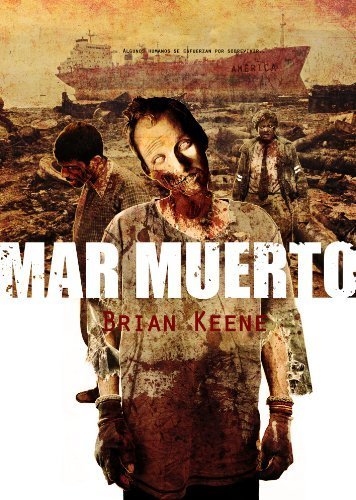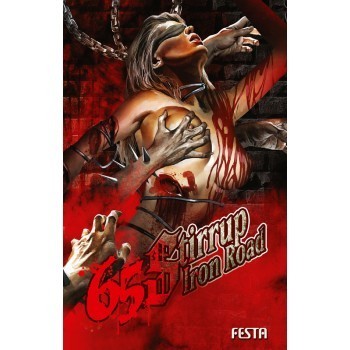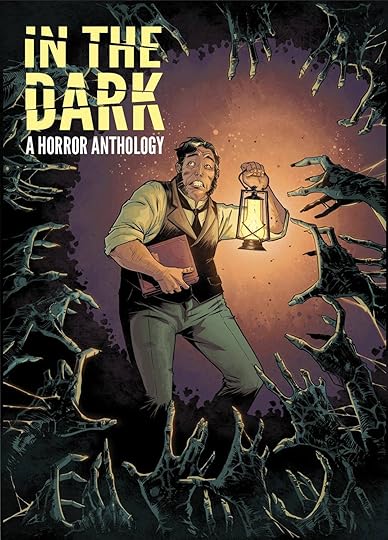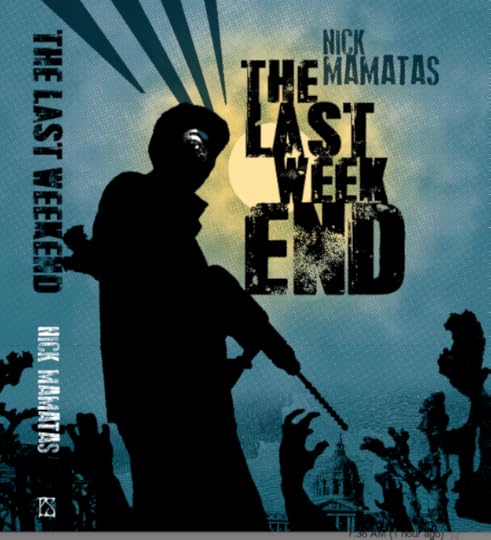Brian Keene's Blog, page 122
February 3, 2014
THE LAST ZOMBIE OMNIBUS (Updated)
*THE LAST ZOMBIE OMNIBUS trade paperback
* Collects all 25 issues of the award-winning comics series
*500+ pages, thick as a phone book
*Kickstarter incentives for as low as $1
*Prints, signed editions, and more
*Chance to die in a forthcoming Brian Keene novel
*CLICK HERE TO PLEDGE YOUR SUPPORT AND SECURE YOUR COPY
(Note to Lifetime Subscribers: Because of the limitation of this book, it will not be included with Lifetime Subscriptions)
UPDATE: I am proud, pleased, and stunned to report that we have exceeded our goal within the first 24 hours. Thank you all so very much. We’ll be discussing the possibilities of stretch goals, extras, etc. and have some updates very soon.
THE LAST ZOMBIE OMNIBUS
*THE LAST ZOMBIE OMNIBUS trade paperback
* Collects all 25 issues of the award-winning comics series
*500+ pages, thick as a phone book
*Kickstarter incentives for as low as $1
*Prints, signed editions, and more
*Chance to die in a forthcoming Brian Keene novel
*CLICK HERE TO PLEDGE YOUR SUPPORT AND SECURE YOUR COPY
(Note to Lifetime Subscribers: Because of the limitation of this book, it will not be included with Lifetime Subscriptions)
February 2, 2014
New Zombies – THE LAST WEEKEND
“You might think that there’s nothing fresh or original in the current crop of zombie fiction, and you’d be right — unless you read The Last Weekend. Nick Mamatas crafts a clever blend of multiple genres that is equal parts heartfelt, fearful, and funny. The Last Weekend is a headshot to a tiresome trope. I loved it!”—Brian Keene, author of The Rising and The Last Zombie.
January 31, 2014
World Domination

If you live in Germany, Austria, Spain, Italy, Poland, Bulgaria, or other countries where my novels have been translated, please check out the new Foreign Edition storefront.
It’s set up just like the other storefronts here on the site, so you’ll find it very easy to use. It even lists the stuff that’s out of print.
January 30, 2014
Source: “Nickolaus Pacione published Ray Faraday Nelson without permission”? (UPDATE: Confirmed)
Most genre fans are, of course, familiar with Ray Faraday Nelson’s seminal short story “Eight O’Clock in the Morning”, which was adapted by John Carpenter as the equally-seminal They Live. That’s why most professionals were dismayed a few years ago when Nickolaus Pacione supposedly purchased the rights to reprint the tale in the vanity project Ethereal Gazette #12. Now, several sources claim Pacione didn’t secure the rights at all, and published the story without Nelson’s permission.
Nickolaus Pacione should be no stranger to any genre writer with an internet connection and access to Google. Over his illustrious “career”, he has stalked and threatened well over four dozen professional writers and editors, as well as their children and family members. His threats — which have included spousal rape, arson, and deadly violence — never progress beyond the safety of his quite-literal basement hidey-hole, but such behavior has earned him several visits from local law enforcement and repeated stays under institutional care. Unfortunately, his release is eventually secured, and Pacione is soon back to spreading his unique brand of love on the Internet.
Also fancying himself a publisher, Pacione has released a number of works via the Lulu.com printing service. In correlation, he often preys upon young writers, having them submit work to him for publication. Given his propensity for violent threats and stalking, this has been a concern in our community for several years, and thus, that is why you’ll find warnings like this elsewhere online. Indeed, author Kevin Lucia recently revealed (via Jason Brock’s Facebook page) that Pacione had stalked a former high school student of his. (A brief aside — this is why it boggles my mind when otherwise seemingly intelligent authors allow Pacione into their social media circles. It’s been proven time and time again that he then mines the friend and follower lists for targets).
But I digress. Pacione has used the publication of Nelson’s story in an effort to further entice other authors to submit works to him. But several sources now allege that Pacione published the story without permission. This wouldn’t be the first time Pacione has been guilty of this. After Jane Timm Baxter discovered that he had published one of her stories without permission in a book called Tabloid Purposes IV, Baxter successfully lobbied Lulu.com to remove the book from sale. Author Jeani Rector has also been a victim of copyright violation at Pacione’s hands.
Further anecdotal evidence was discovered at Wikipedia, where editor Naaman Brown states that Pacione published the Nelson story without permission. Indeed, a check of the revision history on Nelson’s Wikipedia page verifies that Pacione himself made repeated edits to the page in an attempt to self-promote the offending publication (see image below).
It also appears that rather than receiving a copy of the story directly from Nelson or his representatives, that Pacione simply copied it from a website and pasted it into his publication, including all of the errors found in the website’s version.
Mr. Pacione did not respond to repeated requests to offer proof of contracts or emails verifying he had permission to publish the story, but he did post two messages regarding the controversy on one of his many Blogs. You can read his statements in their entirety here and here. It is telling that in the second post, Pacione states “asking for permission actually came as an afterthought” and in regards to producing a contract or other proof “My records with the short story were with my old e-mail address on AOL”.
This is why, regardless of whether you are a beginning writer or a seasoned professional, you should spend ten minutes researching when working with an editor or publisher with whom you’ve had no prior dealings. And why you should always, always, ALWAYS get a contract, even if you aren’t being paid. And why, if you’re allowing Mr. Pacione to follow or friend you on Twitter, Facebook, and elsewhere, you’re allowing him to potentially victimize others in your social circle.
More on this story as it develops.
UPDATE: I now understand this has been confirmed, and printer Lulu.com will be contacted regarding the copyright breach.
*Thanks to the staff of The Rusty Nail who helped research this article.

Source: “Nickolaus Pacione published Ray Faraday Nelson without permission”?
Most genre fans are, of course, familiar with Ray Faraday Nelson’s seminal short story “Eight O’Clock in the Morning”, which was adapted by John Carpenter as the equally-seminal They Live. That’s why most professionals were dismayed a few years ago when Nickolaus Pacione supposedly purchased the rights to reprint the tale in the vanity project Ethereal Gazette #12. Now, several sources claim Pacione didn’t secure the rights at all, and published the story without Nelson’s permission.
Nickolaus Pacione should be no stranger to any genre writer with an internet connection and access to Google. Over his illustrious “career”, he has stalked and threatened well over four dozen professional writers and editors, as well as their children and family members. His threats — which have included spousal rape, arson, and deadly violence — never progress beyond the safety of his quite-literal basement hidey-hole, but such behavior has earned him several visits from local law enforcement and repeated stays under institutional care. Unfortunately, his release is eventually secured, and Pacione is soon back to spreading his unique brand of love on the Internet.
Also fancying himself a publisher, Pacione has released a number of works via the Lulu.com printing service. In correlation, he often preys upon young writers, having them submit work to him for publication. Given his propensity for violent threats and stalking, this has been a concern in our community for several years, and thus, that is why you’ll find warnings like this elsewhere online. Indeed, author Kevin Lucia recently revealed (via Jason Brock’s Facebook page) that Pacione had stalked a former high school student of his. (A brief aside — this is why it boggles my mind when otherwise seemingly intelligent authors allow Pacione into their social media circles. It’s been proven time and time again that he then mines the friend and follower lists for targets).
But I digress. Pacione has used the publication of Nelson’s story in an effort to further entice other authors to submit works to him. But several sources now allege that Pacione published the story without permission. This wouldn’t be the first time Pacione has been guilty of this. After Jane Timm Baxter discovered that he had published one of her stories without permission in a book called Tabloid Purposes IV, Baxter successfully lobbied Lulu.com to remove the book from sale. Author Jeani Rector has also been a victim of copyright violation at Pacione’s hands.
Further anecdotal evidence was discovered at Wikipedia, where editor Naaman Brown states that Pacione published the Nelson story without permission. Indeed, a check of the revision history on Nelson’s Wikipedia page verifies that Pacione himself made repeated edits to the page in an attempt to self-promote the offending publication (see image below).
It also appears that rather than receiving a copy of the story directly from Nelson or his representatives, that Pacione simply copied it from a website and pasted it into his publication, including all of the errors found in the website’s version.
Mr. Pacione did not respond to repeated requests to offer proof of contracts or emails verifying he had permission to publish the story, but he did post two messages regarding the controversy on one of his many Blogs. You can read his statements in their entirety here and here. It is telling that in the second post, Pacione states “asking for permission actually came as an afterthought” and in regards to producing a contract or other proof “My records with the short story were with my old e-mail address on AOL”.
This is why, regardless of whether you are a beginning writer or a seasoned professional, you should spend ten minutes researching when working with an editor or publisher with whom you’ve had no prior dealings. And why you should always, always, ALWAYS get a contract, even if you aren’t being paid. And why, if you’re allowing Mr. Pacione to follow or friend you on Twitter, Facebook, and elsewhere, you’re allowing him to potentially victimize others in your social circle.
More on this story as it develops.
*Thanks to the staff of The Rusty Nail who helped research this article.

January 27, 2014
65 Stirrup Iron Road Comes to Germany
 On sale now in Germany is the novel by myself, Edward Lee, Jack Ketchum, Bryan Smith, J.F. Gonzalez, Wrath James White, Nate Southard, Shane McKenzie, and Ryan Harding that has some reviewers on Amazon screaming and others screaming for our heads. Just like the US editions, proceeds will help Tom Piccirilli.
On sale now in Germany is the novel by myself, Edward Lee, Jack Ketchum, Bryan Smith, J.F. Gonzalez, Wrath James White, Nate Southard, Shane McKenzie, and Ryan Harding that has some reviewers on Amazon screaming and others screaming for our heads. Just like the US editions, proceeds will help Tom Piccirilli.
Pre-order IN THE DARK
 IN THE DARK is available for pre-order through your local comic book shop. It features brand-new horror comics by myself, Rachel Deering, Scott Snyder, Justin Jordan, Cullen Bunn, Duane Swierczynski, F. Paul Wilson, Tim Seeley, Marguerite Bennett, Matthew Dow Smith, James Tynion IV, Sean E. Williams, Mike Oliveri, Nate Southard, Mike Henderson, Mack Chater, Alison Sampson, Valerie D’Orazio, and many more.
IN THE DARK is available for pre-order through your local comic book shop. It features brand-new horror comics by myself, Rachel Deering, Scott Snyder, Justin Jordan, Cullen Bunn, Duane Swierczynski, F. Paul Wilson, Tim Seeley, Marguerite Bennett, Matthew Dow Smith, James Tynion IV, Sean E. Williams, Mike Oliveri, Nate Southard, Mike Henderson, Mack Chater, Alison Sampson, Valerie D’Orazio, and many more.
To pre-order from your local comic shop, give them this code: FEB140452 IDW
January 23, 2014
THE LES DANIELS BLOG TOUR: When Is a Tired Trope Not Tired? You Just Need to Find the Needle in the Haystack – Guest Blog by Matt Bechtel
Starting today, Matt Bechtel of Necon E-Books is embarking on a Blog tour celebrating the work and legacy of the legendary Les Daniels. I’m very honored and humbled to host the inaugural entry here.
It’s fitting that not only this article, but our entire Les Daniels Blog Tour, begins with a story about Bob Booth; after all, Necon (and therefore Bob) is the direct connection between Les Daniels and Brian Keene.
Over the three years Bob acted as a judge for the monthly Necon E-Books Flash Fiction Contest, he adopted a personal edict — he would not vote for any zombie or vampire stories. Why? Because we received SO DAMN MANY of ‘em! Every month, no matter what; we could set the contest theme as “Puppies and Kittens,” and we would get stories of bloodsucking dogs and undead felines.
The funny thing is, of course, that even personal edicts are meant to be broken. Occasionally (and by that I mean VERY rarely), we’d receive a zombie or vampire piece that was so good that even Bob would vote for it despite it’s seemingly played-out trope. In short, if the work is great, TRULY great, it will rise above the maddening crowd and find an appreciative audience, even amongst readers who have been so turned off to its subject matter that they are literally prejudiced against it before reading a single word.
So, despite his flash fiction edict, can you take a wild guess at two authors of whom Bob Booth never grew tired? Big shock, it’s Brian Keene and Les Daniels; in fact, I can’t begin to tell you how many times Bob re-read their seminal works because he returned to them so often.
I’m going to come dangerously close to breaking the longstanding, “What Happens At Necon Stays At Necon” rule here, but when Brian Keene was roasted at Necon 31, well … let’s just say he had to endure a few zombie jokes. But truthfully (and not that I, or anyone, would have ever admitted this during his roast!), those barbs were really guilt by association. Yes, the horror genre has been plagued by a flood of hackneyed, trite, empty zombie stories over the past few decades like … well, a hoard of mindless, empty zombies. Yet that can’t touch or change just how good novels like The Rising and City of the Dead are; in Brian’s hands, even a now-lifeless trope like zombies springs to life (pun fully intended).
Which brings me back to the other novels I mentioned were always, ALWAYS recycled upon Bob Booth’s “To Be Read” list — The Don Sebastian Chronicles by Les Daniels. Truthfully, has any piece of writing other than the Bible inspired as much fiction as Bram Stoker’s Dracula? It honestly feels wrong to even call vampires “a trope;” they’re really more of a cash-cow industry, a subject immune from descending into “fad” status. This, of course, leads to a lot of really sub-par works about vampires (and “sub-par” is being incredibly kind). I’m not talking about ones that are intentionally bad for comic value, like 1972’s infamous blaxploitation film “Blacula;” I mean stuff that only saw the light of day because its main character had fangs and the market’s thirst for bloodsuckers is unquenchable. And before anyone thinks I’m on some kind of “old man horror fan rant” (i.e. “Back in my day we had good vampire fiction!”), this is not a condemnation of any recent pop-culture sensations; quite frankly, there were plenty of lousy vampire stories before any sparkly teenagers kept diaries.
Want proof? There’s a quote upon the cover of the Tor paperback edition of Yellow Fog (Book Four of The Don Sebastian Chronicles, published in 1986) from another true legend of the horror genre, Charles L. Grant — “We’re talking real vampires here!” Five simple words, one of them italicized, letting the reader know that this novel is the wheat needing separation from the chaff (from someone who would definitely know the difference).
I would never be so egotistical as to compare myself to Charles L. Grant, but I knew and respected Charlie well enough to know that the following analogy is one he would’ve made himself — Brian Keene is to zombies what Les Daniels is to vampires. And therein lies the answer to the title question of this article. When is a tired trope not tired? When it’s in the hands of a true artist. In fact, no matter how sick of zombies and/or vampires you may be, I all but guarantee that reading the works of Keene and Daniels will actually make you MORE disgusted with what I referred to earlier as “the maddening crowd” because they’ll remind you of just how GOOD these tropes can be when they’re done right. No matter how many poor, cookie-cutter renditions came before or followed, works like The Rising Series and The Don Sebastian Chronicles will always remain relevant because they are great novels first, zombie/vampire pieces second.
When critiquing writers, “lazy” is a synonym for “bad.” You wanna draft off the work of others and crank out a piece of tripe that will sell? By all means, go for it. Just know that your work will never be appreciated and re-read the way Keene and Daniels are; that’s a distinction reserved for authors with too much respect for their art, their fans, and their genre to be lazy.
***
Just a friendly reminder — The Complete Don Sebastian Chronicles are now available as e-books at www.neceonebooks.com, so please order your copies today!
***
THE LES DANIELS BLOG TOUR continues Monday, 1/27 at the New England Horror Writers website.
January 21, 2014
Miss Manners Guide to Being Nominated for a Bram Stoker Award
Note: The Polar Vortex is about to dump a bunch of snow on us, school is cancelled, and I’m going to be busy with my five-year old all day, so this won’t be a long and thoughtful post. Bram Stoker season is upon us again, which always leads to sniping, arguing, and fighting, especially among authors who are HWA members versus authors who aren’t. Every year, someone asks for my thoughts on the matter. So here they are, excerpted from a discussion this morning on my private Facebook page between myself, J.F. Gonzalez, Ginger Nuts of Horror’s Jim McLeod, and others.
“I’ve got two Stokers, and I *think* I still hold the record for most nominations in a year (nominations, not preliminary) but that being said — it’s a popularity contest among other writers. Does it feel nice? Sure. But it’s rarely representative of the larger readership or community, and instead, is a snapshot of who the HWA’s cool kids are that particular year. Sometimes, deserving works make it onto the ballot, and sometimes, those deserving works even win… but there’s also a lot of blatant nepotism and nonsense on the ballot and in the process itself. Winning one feels nice. Of course it does. It’s nice to win things. But the larger public doesn’t care, and a win isn’t going to do shit for your career. (Mike Oliveri can speak to that).
And therein lies my problem with the awards. If the nominees would just be gracious and humble and handle it with dignity and good grace, it’d be one thing. And most do. But… you also have the contingent of nominees who campaign relentlessly and annoy the fuck out of everyone else. And those people are usually the ones who landed on the ballot via nepotism in the first place. And they are the ones who taint the process for everyone else, including their fellow HWA members.”
An addendum, as I posted earlier on Sephera’s page: “Well, I can’t speak for anyone else, but my post this morning is ONLY about the campaigning for votes. I’m not even a member and already I’m getting spammed with “Hey, will you read this and consider voting?” That happens every year, and it’s annoying and unseemly. My only point was if you’re nominated, conduct yourself with dignity and grace. And the flip side is also true. While it’s okay to express your misgivings about the awards or the process (and many do) it’s a dick move to disparage those nominated. Treat them with dignity and grace, as well.





